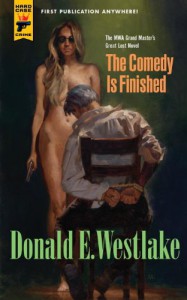 So a bunch of radical nutjob hippies kidnap famous comedian Koo Davis in exchange for the release of "political" prisoners. But let me ask you, who's the real victim here? Koo or the poor schmucks that have to sit around listening to his jokes? Talk about a "captive audience!" Amirite?
So a bunch of radical nutjob hippies kidnap famous comedian Koo Davis in exchange for the release of "political" prisoners. But let me ask you, who's the real victim here? Koo or the poor schmucks that have to sit around listening to his jokes? Talk about a "captive audience!" Amirite?*Chirp, chirp, chirp.*
So what's the deal with Ovaltine? The jar is round. They oughtta call it "Roundtine."
Hey, *taptaptap* is this thing on?
Okay, so, clearly, I'm not a comedian. If I were I'd probably be a murder victim instead of a kidnap victim, which is Koo Davis' predicament in Donald Westlake's The Comedy is Finished. Koo is one of those old-school comedians, the kind that does USO tours and Christmas TV specials, goofball movies and fools around with buxom female celebrities. He's been in the business for years and he never thought that one day a group of SLA/Weathermen-type remnants would nab him and demand the release of political prisoners. After all, this is the late '70s, man. The disco era, not the Che Guevara era. Nevertheless, this is the situation in which Koo finds himself. The question is, then, whether or not Koo can keep his sense of humor when his audience is clearly hostile.
I have to admit that I'm a bit of a newbie when it comes to Donald Westlake. I'm a fan of his Parker novels written under the pseudonym of Richard Stark, but this is the first that I've read under his own name. This one is a bit of an anomaly, being published posthumously thirty years after it was written. Like a lot of "lost" novels, The Comedy is Finished seems a bit rough, even without prior experience of his non-Parker stuff. It seems rushed in some places, slow in others, and somewhat thematically inconsistent. But these themes, although underdeveloped, are what push this lost novel into something more than simply a decent crime read for me.
Politics feature prominently in The Comedy is Finished. Koo regrets his recent use of politics in his comedy routine, thinking that is what has pissed off the terrorists. But we also see that Koo is a product of Cold War politics, as are the kidnappers and Mike Wiskiel, the FBI agent in charge of getting Koo back safely. Particularly interesting to me is the Korean angle, since during the period in which this story was written South Korean politics was in turmoil. While I have no idea if Westlake was aware of the events in South Korea at the time, the mention of the Korean conflict was a timely coincidence.
Secondly, and probably more significantly, Koo's reflection on his own life as an aging comedian, mostly his regrets and disappointments and how they work into his current situation, is really what The Comedy is Finished is all about. While the narrative alternates between the various characters involved (and, interestingly, all are written in past tense but Koo's narrative is written in present tense), the story is really about an old man who is now reevaluating his measure of success.
As I mentioned, though, those ideas are somewhat underdeveloped. Westlake's prose is characteristically clean, with only a couple of excursions in plot (I'm thinking of the very explicit sex scenes-- I'm not being a prude, I'm just not sure they added to the story). While this is a story about a comedian, it's not at all funny, and neither are Koo's jokes, actually (he's more of a mildly humorous zinger kind of guy, I guess). But all in all and despite its shortcomings, The Comedy is Finished is a worthy conclusion to Westlake's canon. And since Westlake is my new book hero, I gotta round this one up to four stars.
And that's it for me, ladies and germs! You've been a great audience! I'll be here all week!



